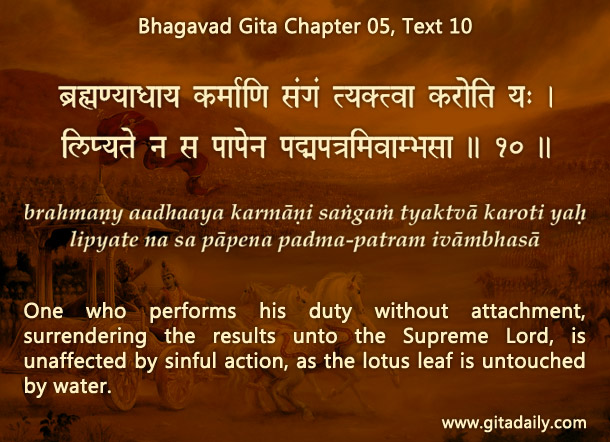Krishna states repeatedly in the Bhagavad-gita that if Arjuna works without attachment to the results of his work, he won’t be entangled. How exactly does detachment keep him disentangled?
To understand, let’s first analyze: what is it that gets entangled? It is our consciousness. As a gross example of entanglement, consider an alcoholic. They may be physically free to go anywhere, but wherever they go, their consciousness goes to a bar or drink. Periodically, it becomes so filled with thoughts of alcohol that they feel tormented till they drink.
Our consciousness similarly gets fixated on the results of our work when we are attached. Results may come and go, results may not come at all, results may remain unclear or uncertain — through all such permutations, our consciousness stays entangled. In fact, it was attachment to results that had paralyzed and overwhelmed Arjuna (02.06).
And how does our consciousness become entangled? Due to our mind or, more precisely, due to the impressions stored in our mind. In our present embodied state, our consciousness, which originates from our soul, is routed through our mind to the outer world. Alcoholics are entrapped because of the impressions of drinking that keep playing in their minds.
What forms the impressions in our mind? Primarily sensory perceptions, especially those perceptions that we dwell on many times, for a long time and with much emotion. Thus, the frequency, duration and intensity of perceptions determines whether they are transformed into impressions or not.
When we cultivate detachment, we may still encounter sensory perceptions, including perception of the fruits of our work. But our detachment prevents those perceptions from sticking to our mind — just as water can’t stick to a lotus leaf (05.10). When perceptions pass through our mind without becoming impressions, we don’t become bound.
When Arjuna complements his outer engagement in the war with inner detachment from its results, he can stay free from entanglement.
One-sentence summary:
Detachment prevents sensory perceptions from becoming mental impressions that bind our consciousness to worldly objects.
Think it over:
- When we get entangled, which part of us becomes entangled?
- What role does our mind play in our entanglement?
- How does detachment protect us from entanglement?
***
05.10: One who performs his duty without attachment, surrendering the results unto the Supreme Lord, is unaffected by sinful action, as the lotus leaf is untouched by water.
To know more about this verse, please click on the image


Leave A Comment